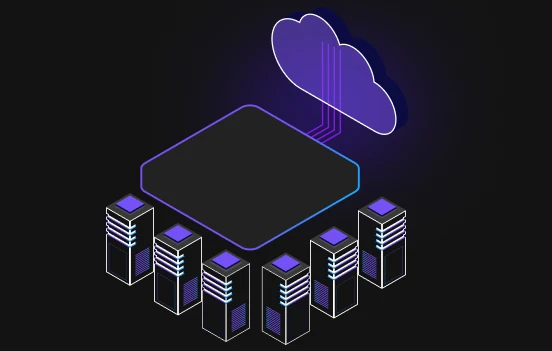Hybrid cloud refers to a computing environment that combines on-premises infrastructure with public or private cloud services, providing the best of both worlds—control and flexibility. On the other hand, multi-cloud architectures, use multiple cloud providers to distribute workloads, reducing dependency on a single vendor, and optimizing performance, cost, and redundancy.
With these architectures, businesses can customize their IT strategies to meet specific needs. For instance, mission-critical workloads can reside in private clouds for greater control, while customer-facing applications can leverage the scalability of public clouds. However, these advantages come with the following data security in cloud computing challenges.
The Security Challenges of Hybrid and Multi-Cloud Environments
- Dispersed Data: Data is spread across different silos, including on-premises systems, private clouds, and multiple public cloud providers. Each environment has its own proprietary set of security solutions, which makes data security in the cloud more complex.
- Compliance Needs: Complying with regulations like GDPR, HIPAA, or CCPA in a distributed architecture requires visibility and control over where and how sensitive data is stored and accessed in cloud data security strategies.
- Shared Responsibility Model: Cloud providers safeguard infrastructure, but data security on cloud computing remains the customer’s responsibility.
- Rise of Quantum Computing: This rapidly evolving technology will soon be able to break current encryption algorithms, creating a need to adopt Post-Quantum Cryptograpy (PQC) solutions that provide advanced, quantum-resistant security to maintain the security of data in the cloud.
Addressing these challenges requires a centralized security approach that includes robust data encryption, key management, storage visibility, and control over all data-centric workloads—exactly what Fortanix delivers.
Let’s examine three prime capabilities of Fortanix solutions.
Fortanix Solutions for the Hybrid and Multicloud
1) Simplifying Multicloud Key Management
Organizations face a growing challenge in managing encryption keys across multiple Cloud Service Providers (CSPs). Each CSP offers proprietary Key Management Systems (KMS), that create fragmented security and might lead to key sprawl.
This makes tracking key usage, maintaining compliance, and applying Zero Trust principles difficult. When CSPs hold custody of encryption keys, organizations give up control of sensitive data and compromise privacy regulations like GDPR and Schrems-II.
Fortanix Data Security Manager (DSM) solves this challenge with centralized, full-lifecycle key management across hybrid and multicloud environments. Its platform, available as a SaaS or an appliance, supports Bring Your Own Key (BYOK) and Bring Your Own Key Management Service (BYOKMS), ensuring keys remain under the organization's control.
Stored on highly secure FIPS 140-2 Level 3-certified HSMs, these keys are protected from unauthorized access. Fortanix DSM enables uniform access control policies from a single interface, so that organizations can secure their data while maintaining full key custody.
2) Modernizing Legacy HSMs
Organizations face the complexity, high costs, and rigidity of legacy Hardware Security Modules (HSMs), which struggle to align with modern, cloud-first data security needs. These outdated systems, designed long before the rise of DevOps and SaaS solutions, lack the flexibility, automation, and scalability required in today’s environments. This affects operational efficiency and delays cloud-driven initiatives. Organizations are stuck with infrastructure that no longer meets their data security on the cloud demands.
Fortanix addresses this challenge by modernizing legacy HSM infrastructure with a unified, cloud-first approach. Through Fortanix Data Security Manager (DSM) and the HSM gateway, organizations can securely access keys stored in existing HSMs while enabling seamless integration with cloud environments.
This centralized solution deploys in minutes, eliminates the need for costly rip-and-replace upgrades, and complies with the same FIPS 140-2 Level 3 requirements that legacy HSMs provide. Fortanix ensures organizations retain their legacy investments and achieve the scalability, simplicity, and security needed to accelerate their data security in cloud computing initiatives.
3) Cryptographic Security Posture Assessment
The growing silos of data and encryption keys create visibility and control challenges for security teams. When discovering keys across hybrid multicloud environments requires manual processes and custom scripts, it is prone to errors and delays.
Fortanix Key Insight solves these challenges by automatically discovering encryption keys and associated data services across cloud computing and data security silos. Its unified dashboard maps keys to data services and provides detailed insights into an organization’s cryptographic security posture.
Security teams can easily identify key types, usage, and encryption gaps and evaluate alignment with best practices and regulatory standards. This visibility enables security teams to prioritize risks, implement corrective actions, and continuously improve the security posture. The Fortanix platform offers crypto agility to mitigate data exposure risks proactively and prepare organizations for the post-quantum era.
On-demand webinar: 5 Must Haves for Modernizing Multi-cloud Data Security
Conclusion
Cloud data security starts with managing your cryptographic setup. Fortanix solutions help organizations unify cryptographic security, data encryption, and enterprise key management in hybrid multicloud environments.
Fortanix solutions provide centralized visibility and consistent policy enforcement. They solve issues like key sprawl, ensure compliance with regulations such as GDPR and HIPAA, and prepare for quantum-resistant cryptography.
The solutions are built to scale and address future challenges. Whether upgrading HSMs, adopting a Zero Trust model, or getting ready for Post-Quantum Cryptography,getting ready for Post-Quantum Cryptography, Fortanix helps protect your data wherever it resides.
Connect with our team for a demo.

 Cite this article
Cite this article









